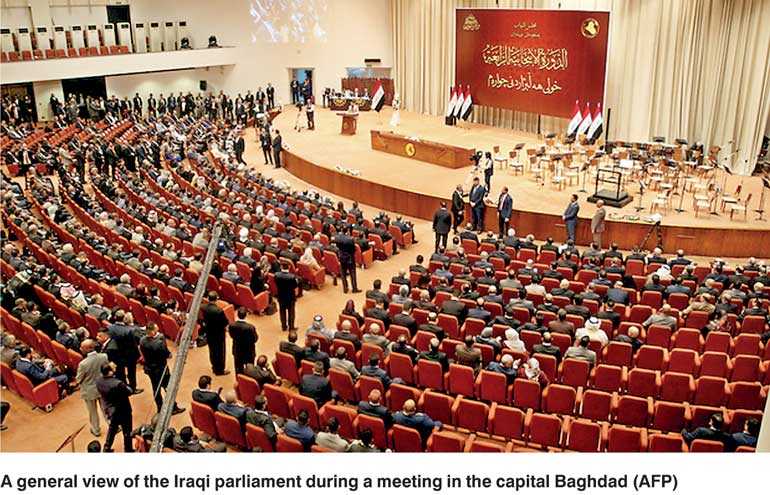Sunday Feb 22, 2026
Sunday Feb 22, 2026
Monday, 17 September 2018 00:10 - - {{hitsCtrl.values.hits}}

ERBIL/SULAIMANIYA, Iraq (Reuters): Iraq’s parliament elected Sunni lawmaker Mohammed al-Halbousi as speaker on Saturday, marking an important step towards establishing a new government four months after an inconclusive national election.
Parliament had been due to elect a speaker and two deputies during its first meeting on Sept. 3, but failed to do so as lawmakers were unable to determine which competing bloc had the most seats.
Hassan al-Kaabi, who ran on Moqtada al-Sadr’s Saeroon list which came first in May’s national election, was elected as Halbousi’s first deputy. The vote for a second deputy was inconclusive and will be put to a second round on Sunday.
Halbousi’s election marks the start of a 90-day process outlined in the constitution, designed to eventually lead to a new government.Lawmakers must next elect a new president and task the leader of the largest bloc to form a government as prime minister. But a dominant bloc has yet to emerge, against a backdrop of shifting political alliances.
Halbousi defeated former Defence Minister Khaled al-Obeidi, winning the position with 169 votes, according to Shi’ite lawmaker Husham al-Suhail. Iraq’s parliament contains 329 seats.
Announcing the vote, the temporary leader of the assembly said Halbousi, 37, had become the youngest speaker of parliament in Iraq’s history.
Before running in May’s national election as a candidate on the Anbar Our Identity electoral list, Halbousi was the governor of Anbar province. He had previously served in Iraq’s parliament, from 2014 to 2017.Since Saddam Hussein was toppled in a 2003 US-led invasion, power has been shared among Iraq’s three largest ethnic-sectarian components. The prime minister has traditionally been a Shi’ite Arab, the speaker of parliament a Sunni Arab and the president a Kurd.
Iraqis voted in May in their first parliamentary election since the defeat of Islamic State’s self-declared caliphate, but a contentious recount process delayed the announcement of final results until last month.
TEHRAN, AFP: Iran on Sunday hailed the selections made by Iraq’s parliament a day after the body elected candidates backed by a pro-Tehran bloc as speaker and first deputy.
“The Islamic Republic of Iran supports decisions made by the (Iraqi) people’s elected representatives,” foreign ministry spokesman Bahram Ghasemi said.
“The Islamic Republic of Iran has always supported Iraq’s democracy, territorial integrity and national sovereignty,” he added.
Iran is a key power broker in neighbouring Iraq and many of the militias that played a central role in ousting the Islamic State group are known to be close to Tehran.
Iraq’s national politics has been in paralysis since the May 12 national elections, but Saturday’s appointments were expected to solidify new alliances and pave the way towards forming a government.
“We hope we soon witness the election of the president and prime minister to form a new Iraqi government,” said Ghasemi.
Lawmakers appointed as speaker former Anbar governor Mohammed al-Halbusi, a Sunni politician backed by a pro-Iran bloc led by Hadi al-Ameri’s Conquest Alliance -- a coalition of anti-jihadist veterans close to Tehran.
The post of first deputy speaker was given to Hassan Karim, put forward by populist Shiite cleric Moqtada Sadr whose list won the largest share of seats in the election.
Baghdad and Tehran, which fought a brutal war from 1980 to 1988, came closer after the fall of Saddam Hussein in 2003 and the rise of Iraq’s Shiite majority on the political landscape.